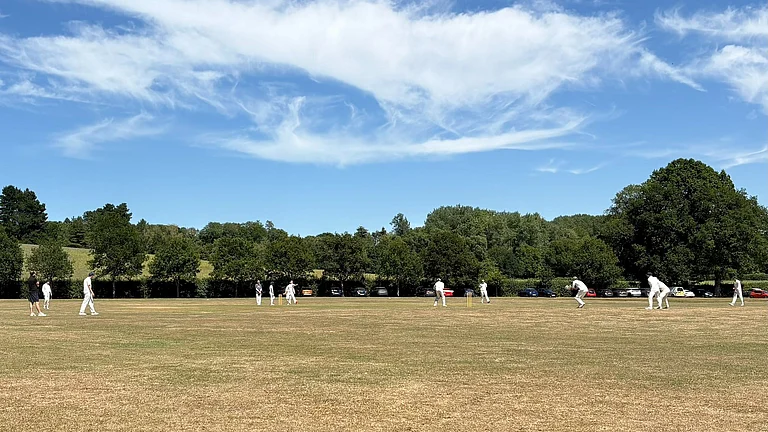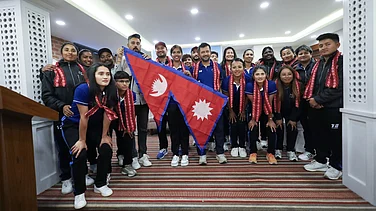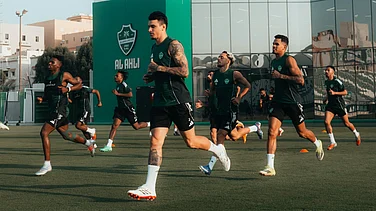The Decision Review System (DRS) controversy in the third South Africa versus India Test at Cape Town may have slipped under the radar in the wake of Virat Kohli's shocking resignation as Test captain, but the International Cricket Council's rather tepid reaction to the unsavoury incident has not been in line with protecting the spirit of the game. (More Cricket News)
Virat Kohli blatantly expressed his displeasure after the TV umpire negated a LBW decision against South African skipper Dean Elgar in the final session of play on Day 3 at Newlands. Fancied India went on to lose the series on Day 4.
Although the on-field umpire Marais Erasmus ruled Elgar out, the Hawk-eye technology used for ball tracking for a player review, showed the Ravichandran Ashwin delivery was clearly going over the stumps.
With India fighting to deny South Africa a series-winning third Test at Newlands, Kohli's outburst by speaking into the stump microphone triggered a slew of angry reactions from his teammates.
KL Rahul, the team's vice-captain and usually very sober on the field, added fuel to fire.
Rahul said: "It's the whole country against 11 guys." And a charged-up Ashwin was more categorical, saying: "You should find better ways to win, SuperSport (the host broadcasters)."
It is understood that the ICC match referee Andy Pycroft warned the Indian cricket team saying that a 'repeat' will invite serious consequences but the world body has clearly hid behind what it calls a 'technicality' under which the Indians were not booked.
UNCOUTH BEHAVIOUR
Universally implemented, 'bringing the game into disrepute' is defined legally as follows: ‘A participant shall at all times act in the best interests of the game and shall not act in any manner which is improper or brings the game into disrepute or use any one, or a combination of, violent conduct, serious foul play, threatening, abusive, indecent or insulting words or behaviour.’
In Cape Town, Kohli, Ashwin and Rahul were both indecent and insulting not only to the broadcasters but to the entire nation, supposedly a friend of India in world cricket.
Like the Border-Gavaskar Trophy or the Pataudi Trophy, a Test series between India and South Africa is played for the Freedom Trophy. Dedicated to Mahatma Gandhi and Nelson Mandela, two political leaders whose tolerance levels against oppression, anarchy and racism are well known, cricket matches between India and South Africa have not always been free from controversy.
The recent Cape Town DRS incident is rather shocking. Indian players calling South Africans 'cheats' demanded stronger action from the ICC.
REVISITED
Circumstances forced by the COVID pandemic and a piece of ugly history - Mike Denness banning Sachin Tendulkar for ball-tampering in the November 2001 Test in Port Elizabeth - may have stood in the way of some stricter action against Kohli and Company.
From a diplomatic standpoint, Cricket South Africa, blighted by its own internal issues, may have feared that any confrontation with the BCCI would jeopardise future cricket relationship with India.
After all, the BCCI agreed to play this curtailed series at a time when the coronavirus variant Omicron was playing havoc in South Africa and several international events were getting cancelled.
Plus, South Africa would have remembered how the BCCI took ICC head-on when former England captain Mike Denness had suspended six Indian cricketers, including Sachin Tendulkar and Sourav Ganguly, for various reasons in the second Test at Port Elizabeth in 2001.
TENDULKAR BANNED
Tendulkar was banned for a Test for ball-tampering, Ganguly was suspended for a Test and two ODIs for failing to handle his team and Virender Sehwag was slapped with an immediate one-Test ban for dissent and over appealing.
Tendulkar's ban was even discussed in the Indian Parliament. Fans called Denness a racist and BCCI wanted him out of the series. ICC did not cede to BCCI wishes and the third Test at Centurion became an unofficial game with Rahul Dravid leading the side.
Denness served as ICC match referee for only three more ODIs and two Tests. He was never reappointed by the ICC again. Now, with BCCI virtually controlling world cricket with its financial might, ICC clearly opted for a quick fix that would not anger India because the three ODIs still remained to be played in South Africa, starting Wednesday.
Just like Port Elizabeth, the Cape Town incident will always remain a scar in the cricketing relationship between India and South Africa.


























